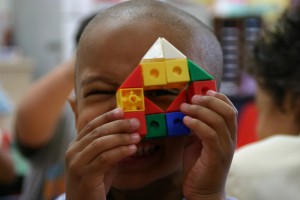Hanna Perkins’ Parent/Toddler Group is more than a simple play group. Meeting for 90 minutes, twice a week, every moment has purpose.
Giving young children manageable exposure to the kind of social experiences that will become part of their everyday lives; and introduce them to the process of learning.
Giving parents/caregivers better understanding of what’s going on in a child’s mind, and equip them with tools to effectively guide the toddler through this important developmental stage.
The Parent/Toddler group helps children and parents work together through this important developmental period.
Teachers help parents give meaning to, and verbalize, each child’s actions. This helps the child start sequencing actions – creating connection between before and after, and building a narrative – prerequisites for symbolic thinking, language development and literacy.
Children are introduced to the natural world through growing plants, observations of the weather and attention to small animals. Art activities, dramatic play, puzzles, books, and a mindfully selected variety of toys:
- Enhance development of fine motor skills
- Develop problem-solving abilities;
- Help children find pleasure in mastering basic skills (such as holding a marker or using scissors);
- Increase attention span;
- Foster tolerance for the frustrations that are part of learning itself.
Over the course of 90 minutes, toddlers experience transitions, excitement, sharing, waiting and following instructions – learning to manage these ordinary challenges under the caring guidance of a loved one in an environment that is routine and comfortable. Parents/caregivers come to understand these stress points from the child’s perspective – learning what to say and when for gentle, effective guidance that helps the child through routine social challenges.





 Toddlers are beginning to think on their own and act as individuals. But they don’t have much experience with the complex world around them, and their vocabulary to ask about it is limited.
Toddlers are beginning to think on their own and act as individuals. But they don’t have much experience with the complex world around them, and their vocabulary to ask about it is limited.